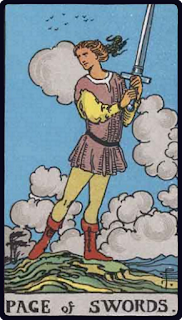
Representing study; the Page of Swords represents a rebirth and renewal, a period of reconstruction after conflict comes to an absolute end. Renewed optimism leads to opportunity and growth that sees retrospection given respect and reverence.
In the upright state the Page of Swords represents the will to move beyond ego, and the desire to understand met with the opportunity to gain insight and revelation. A renewal of hope is portended.
In the inverted state the Page of Swords represents the pursuit of understanding without hope, an endeavour we may not believe will succeed but is pursued nonetheless for the sake of understanding alone.
In the Rider-Waite deck the Page of Swords bears resemblance to the soldier depicted in the 5 of Swords who collected the swords from the scene. A soldier who has seen the futility of conflict and regards those who engage with amusement, the Page recognises engaging in conflict only amplifies conflict.
Carrying a single sword pointed away from them the Page stands in a defensive position not offensive. They seek understanding with no desire to engage in conflict they are driven by curiosity alone. The Page of Swords can therefore be taken as a sign that curiosity will be piqued and that further study and investigation is encouraged to develop our understanding.
In self-reflection the Page of Swords serves as a prompt to consider the skills and abilities that have been learned and put them into practice. The learning process does not end, just as our state of being continues to evolve over time, our understanding must also adapt to the changes we encounter. Learning is a lifelong process and the Page of Swords in particular is a reminder that your thought processes cannot remain static as your environment will reduce their effectiveness over time.
It’s important to recognise growth in yourself and growth in those who you interact with. As we encounter new people we learn their limits, their modes of communication, and the experiences they draw upon, we should not forget that the people we already know do not remain static, they are dynamic as are we, and as their mentality grows and changes you need to revaluate your connection to them at times.
Where monumental changes happen that can redefine our priorities in life whether these happen to us or to those we interact with, we may need to reset our entire relationship and rebuild. Once again, the Suit of Cups is drawn into our thought processes, here the Ace of Cups in particular may be drawn into play.
Observation is the next tool you will acquire, by observing the behaviours of others and considering those in the context of what you have learned, you will begin to rationalise behaviour that once seemed erratic and spontaneous and identify the patterns that emerge. Observation is only possible once a base level of understanding has been achieved. This is the point where you step back from interacting with others and become a presence rather than an influence.
Ask yourself “Why do they do that?” and reflect on the possible explanations for their behaviour; where you find yourself with no comprehension or no speculation as to the cause of their behaviour then you should seek further information by engaging in conversations in an attempt to develop that understanding. Where this relates to your own behaviours that you cannot understand, you will need to seek external perspectives by communicating with others. It is important to recognise when you seek this perspective you are seeing yourself through their eyes, and whilst you may not agree with their perspective you should not take it as a personal attack or criticism, the fact that they did not share this perspective until it was asked should inform you of their behaviour assuming the role of an observer of your life.
Understanding the behaviour of others can be a source of knowledge and preparation that can in turn inform our own behaviour. Seeing how others react to situations we have never experienced can prepare us for the possibility of encountering those situations. In the reverse, seeing the impressions and perspectives of others in response to situations we have experienced that they have not, we can gain a perspective that is not influenced by experience.
When we set out to understand framing, we emphasised context and the concept that behaviours in context often make sense that would not do so out of context; here seeking external perspectives that lack experience can give us an impression of our behaviour out of context which can allow us to gauge how far-removed our behaviour in context has become. This is particularly important for recognising negative influences that we may not consider negative.

No comments:
Post a Comment
All comments are moderated before they are published. If you want your comment to remain private please state that clearly.